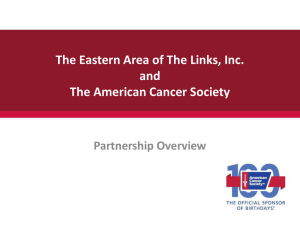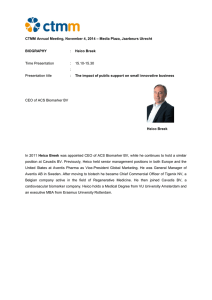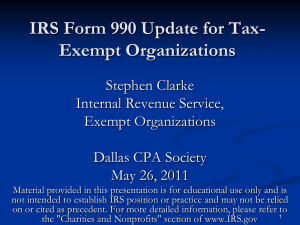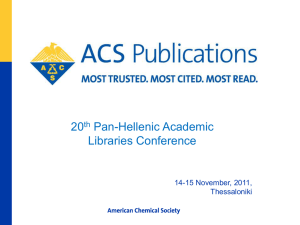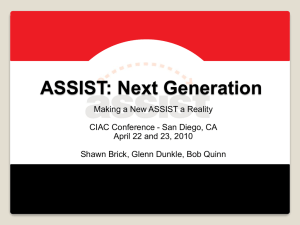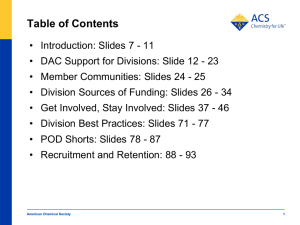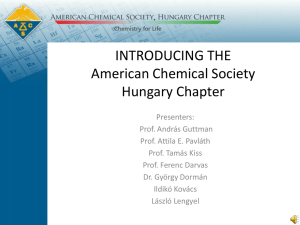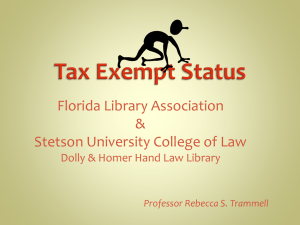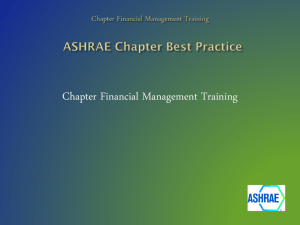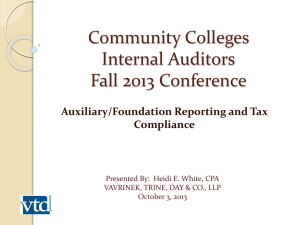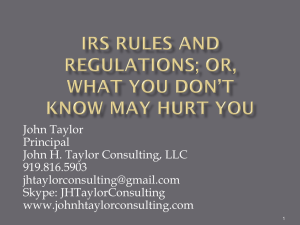Presentation Slides - American Chemical Society
advertisement
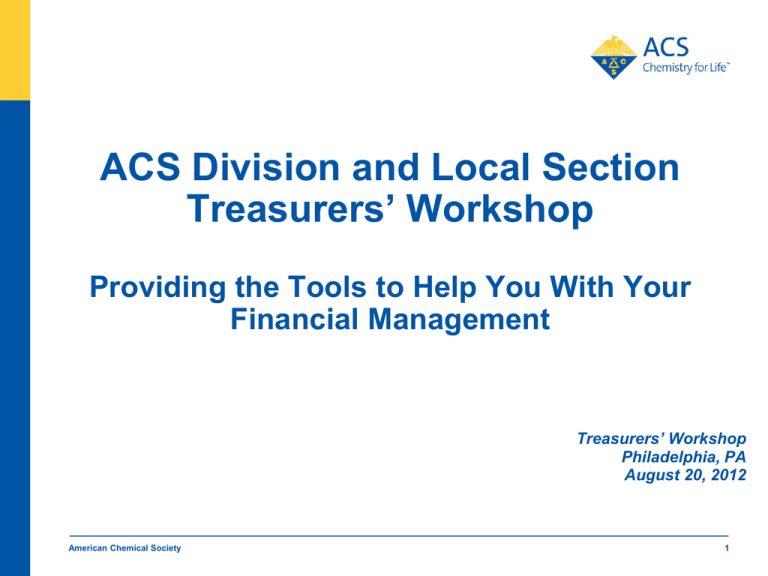
ACS Division and Local Section Treasurers’ Workshop Providing the Tools to Help You With Your Financial Management Treasurers’ Workshop Philadelphia, PA August 20, 2012 American Chemical Society 1 Objectives • Define your role as Treasurer • Preparing for Compliance With the IRS • Budgeting • Incorporate or Not • Your Questions • Resources American Chemical Society 2 You are THE Treasurer • The Financial Officer • FORMS – Annual Report submission – Bylaw requirement – Facilitates the allotment disbursement – Assists DAC and LSAC with assessing the health and vitality of divisions and sections American Chemical Society 3 Responsibilities • Retain accurate and proper records – Bank records, invoices, receipts • Maintain a book of accounts (ledger) showing the details of all revenues and expenses • Manage Bank accounts • Maintain records of all investments • Keep the executive committee informed of all financial matters • File appropriate IRS forms and provide ACS with a copy • Review the section’s or division’s Bylaws to determine if there are other duties required by the section or division American Chemical Society 4 SHARE YOUR EXPERIENCE American Chemical Society 5 ACS Division and Local Section Treasurers’ Workshop Preparing for Compliance with IRS Requirements Treasurers’ Workshop Philadelphia, PA August 20, 2012 American Chemical Society 6 Objectives • Provide information regarding the ACS and affiliated organizations’ tax-exempt status • Clear any misconceptions regarding the tax-exempt status of affiliated organizations and their relationship with ACS • Identify the benefits of tax-exempt status • Identify the actions that jeopardize tax-exempt status • Review the mandatory federal tax filings • Identify other requirements (public inspection, public support test , acknowledging donors) American Chemical Society 7 ACS Basic Organization Information • Type of exempt organization: Charitable non-profit scientific and educational organization • Exempt under IRC Section 501(c)(3) • Exempt from federal income tax • Non-private foundation under IRC Section 509(a)(2) Public Charity • IRS determination letter (originally issued on January 18,1938) American Chemical Society 8 Tax-Exempt Status of ACS Affiliated Organizations • ACS affiliated organizations include: – Local Sections, Divisions, Subdivisions, and Regions • Type of exempt organization: Charitable non-profit scientific and educational organizations • Exempt under IRC Section 501(c)(3) through ACS Group Exemption Letter (if election is made by organization) – IRS Group Exemption Determination Letter (most recent issued February 4, 2003) • Exempt from federal income tax • Non-private foundation under IRC Section 509(a)(2) Public Charity American Chemical Society 9 What is the ACS Group Exemption? • IRS granted exemption to ACS affiliated organizations through the ACS Group Exemption Letter – ACS is the central organization – ACS must take measures annually to keep group exemption letter in force – Group exemption number: 0945 – Re-election to be included under ACS group exemption must be made every year via ACS annual report – New local sections, divisions, regions, subdivisions can obtain taxexempt status by electing to be included within the ACS group exemption letter American Chemical Society 10 What is the ACS Group Exemption? (cont.) • Affiliated Organizations (Local Sections, Divisions, Subdivisions, Regions) – ACS does not have operational and financial control – Affiliated organizations are separate legal entities • Each has their own federal employer identification number (FEIN); (also called taxpayer identification (TIN), or federal id number • DO NOT USE ACS FEDERAL ID NUMBER • If you do not know your EIN, contact ACS Tax Office – Each one must prepare their own individual/separate financial reporting and tax filings to maintain tax-exempt status – Each one must maintain non-private foundation status by meeting public support test American Chemical Society 11 Quiz (True or False) • Because ACS is tax-exempt, all its affiliated organizations maintain their tax-exemption through the ACS group exemption umbrella. • (FALSE) • ACS affiliated organizations have to file tax returns to the IRS even though we are tax-exempt. • (TRUE) • ACS affiliated organizations do not have to file any tax returns to the IRS since their gross receipts are less than $50,000. • (FALSE) • ACS does not file tax returns on behalf of ACS affiliated organizations. • (TRUE) • ACS files a group return that includes the affiliated organizations’ finances. • (FALSE) • The annual report submissions to ACS constitute IRS filings. • (FALSE) • ACS affiliated organizations cannot use the ACS federal id number. • (TRUE) • ACS affiliated organizations cannot use the ACS sales tax exemption for their purchases. • (TRUE) American Chemical Society 12 Benefits of 501(c)(3) Status • Income from exempt purpose related activities are exempt from federal income tax • Exempt from federal unemployment taxes • Exempt from some state taxes (e.g., income, sales, employment) • Contributions received are tax deductible to donors • Tax-exempt financing available • Reduced postal rates available American Chemical Society 13 What Jeopardizes § 501(c)(3) Status? • FAILING TO MEET FILING REQUIREMENTS • Inurement/private benefit activities prohibited and restricted • Lobbying activities must be insubstantial • Political activities are absolutely prohibited • Failing to operate with an exempt purpose • Unrelated business activities must not be the primary purpose – Exempt purpose is found in organization’s organizing documents such as Articles of Incorporation, Articles of Association, Constitution, or Bylaws American Chemical Society 14 Federal Tax Filing Requirements • Information returns (Form 990 series): – Form 990 - Return of Organization Exempt from Income Tax – Form 990-EZ - Short Form Return of Organization Exempt from Income Tax – Form 990-N (e-Postcard) • Income tax return: – Form 990-T – Exempt Organization Business Income Tax Return (If you have UBI) • Other information returns: – Form 1099 MISC - Miscellaneous Income – Form 1096 - Annual Summary and Transmittal of U.S. Information Returns American Chemical Society 15 Form 990 Series Overview Form 990 is also a tool for an exempt organization to show: • It is organized and operated as a tax-exempt entity • It is in compliance with all applicable tax laws • It has a mission it continues to fulfill • It responsibly safeguards its assets American Chemical Society 16 Which Form 990 to File? Based on Gross Receipts Form to Tax Year 2011 + Rules Gross receipts normally ≤ $50,000** Gross receipts > $50,000 AND < $200,000, AND Total assets < $500,000 Gross receipts ≥ $200,000, OR Total assets ≥ $500,000 File 990-N (e-Postcard) 990-EZ 990 ** How to determine if gross receipts are normally ≤ $50,000 : Take the average gross receipts based on a 3-yr period to include tax year + 2 prior tax periods The Form 990 series of returns (Form 990, 990-EZ, or 990-N) are mandatory for 501(c)(3) organizations American Chemical Society 17 Federal Tax Filing Requirements Form 990 - Gross Receipts What are gross receipts? 1. Contributions 6. Gross rents 2. Program Service Revenue 7. Other Investment Income 3. Membership Dues & Assessments (includes ACS Allotments to Divisions and Local Sections) 8. Sale of Assets, Other than Inventory 4. Interest - Savings/Temporary Investments 9. Special Events 10. Gross Sales of Inventory 11. Other Revenue 5. Dividends & Interest-Securities American Chemical Society `18 Federal Tax Filing Requirements Form 990-N What is needed to complete 990-N? • Employer identification number (EIN) • Tax Year • Legal name & address • Other names the organization uses • Name and address of a principal officer • Website address (if one exists) • Confirmation that the organization’s gross receipts at or below the threshold Filing Website: http://epostcard.form990.org/ American Chemical Society 19 Federal Tax Filing Requirements Mandatory Schedules Required for Forms 990 and 990-EZ • For BOTH Form 990 and 990-EZ, must include – Schedule A, Public Charity Status and Public Support – Schedule B, Schedule of Contributors (required if the organization received, during the reporting year, $5,000 or more in money or property from any ONE contributor) • For Forms 990 ONLY, must include – Schedule O, Supplemental Information to Form 990 • Additional schedules are required based on responses to questions American Chemical Society 20 Federal Filing Requirements – When to File? FILING DATES: Due Date for all 990 returns: File by the 15th of the 5th month after the end of the organization’s accounting period. This will be May 15th for a calendar year filer. EXTENSIONS For Form 990 or 990-EZ File IRS Form 8868 to get an initial 3-month extension. An additional 3 month extension may be requested if original 3 months was not enough time. Form 990-N is due on May 15th of each year. NO EXTENSIONS! American Chemical Society 21 Federal Tax Filing Requirements Where to file? • Paper returns are filed in Ogden, UT: Department of the Treasury Internal Revenue Service Center Ogden, UT 84201-0027 • Electronic filing is required for Form 990 filers with assets of $10 million AND at least 250 returns • The IRS recommends that all organizations, regardless of size, file electronically. American Chemical Society 22 Federal Tax Filing Requirements Non-Filers/Late Filers Penalties Penalties for late filing, incomplete or inaccurate return: • Against organization: $20 a day for each day the return is late ($10,000 maximum); or 5% of the gross receipts • Against responsible person(s): $10 a day not to exceed $5,000 American Chemical Society 23 Federal Tax Filing Requirements Non-Filers/Late Filers Penalties Failure to file for 3 consecutive years: • Loss of tax-exempt status (automatic revocation) • Must file annual income tax return (Form 1120) and pay taxes, if owed • Donations are not tax-deductible • Not eligible to be included in ACS Group Exemption (will be removed) • Central organization (ACS) cannot obtain exemption for subordinate organization • You must re-apply for your organization’s tax-exemption American Chemical Society 24 American Chemical Society 25 AUTOMATIC REVOCATION OF TAX EXEMPT STATUS HELP !!! I HAVE BEEN AUTO-REVOKED!!! How do I get Reinstated? American Chemical Society 26 AUTOMATIC REVOCATION - HOW TO GET REINSTATED • To get reinstatement the organization (NOT ACS) must file FORM 1023 regardless of whether the organization was originally required to apply for exemption. • Write “Automatically Revoked” at the top of the application. • Must pay the appropriate user fee (See Revenue Procedure 2011-8 and 2011-36) • Notice 2011-43 provides transitional relief for certain small organizations (990-N filers) if the application is filed by December 31, 2012. • An organization may also request retroactive reinstatement as part of the application. • The organization MUST file Form 1023 even if it was covered under a group exemption. • Visit the IRS website under Charities for a list of frequently asked questions. www.irs.gov/charities American Chemical Society 27 AUTOMATIC REVOCATION OF TAX EXEMPT STATUS Beware! You do not want to have your tax-exempt status automatically revoked! If it is revoked, only YOU can file for reinstatement! By law, an organization that fails to file Form 990, 990-EZ, or 990-N for three consecutive years will have its tax-exempt status automatically revoked as of the filing due date for the third return. File your returns! American Chemical Society 28 Federal Tax Filing Requirements -Other • Form 990-T – Exempt Organization Business Income Tax Return • Form 1099 MISC - Miscellaneous Income • Form 1096 - Annual Summary and Transmittal of U.S. Information Returns American Chemical Society 29 Federal Tax Filing Requirements Form 990-T (Exempt Organization Business Income Tax Return) When are you required to file Form 990-T? • Unrelated business income $1,000 • UBI is income from: – A trade or business – Conducted on a regular basis – That is not substantially related to the organization’s exempt purpose American Chemical Society 30 Federal Tax Filing Requirements Form 990-T Examples of some of the more common forms of unrelated trade or business activities include. • Advertising • Gaming • Sale of merchandise and publications – unrelated to exempt purpose. Exclusions (not UBI) • Interest and dividends • Royalty income American Chemical Society 31 Federal Tax Filing Requirements (Form 1099-MISC) When are you required to file Form 1099-MISC? • Paid at least $10 in royalties • Paid at least $600 in rents, services, prizes and awards, other income payments, medical and health care payments, attorney fees, speaker fees, payments to corporations for legal services. • Scholarships/Fellowships – not required to be reported • Travel Reimbursements – not required to be reported if recipient provides adequate accounting of the amount to be reimbursed and includes these four elements: amount, place, time and business purpose. You need to obtain vendor’s taxpayer identification before making any payments using IRS Form W-9 Request for Taxpayer Identification Number and Certification. American Chemical Society 32 Other Requirements - Public Support test What is the public support test? • The IRS applies public support ratio tests on an annual basis to determine an organization’s public charity versus private foundation status • ACS and affiliated organizations must meet individual public charity status and non-private foundation status • The public support test appears on Schedule A (Form 990 or 990EZ). To maintain 509(a)(2) – public charity status, you need to meet the public support test: At least 1/3 of organization’s gross receipts are from public support and exempt function combined, and Less than 1/3 of its support is from investment income American Chemical Society 33 Other Requirements - Public Inspection Information Subject to Inspection: • Forms 990, 990-EZ, and 990-T, including all schedules and attachments (except names and addresses of contributors) • Form 1023: Application for Tax Exemption filed after July 15, 1987 • Must furnish copies upon request • May charge a reasonable fee American Chemical Society 34 Other Requirements – Acknowledging Charitable Contributions Quid Pro Quo • Disclose value of goods or services provided to donor when contribution >$75 . • Disclose at time of solicitation or receipt of contribution. Other • Donor must have contemporaneous acknowledgement for donations ≥ $250 • New – donor must have a bank record or charity documentation for any amount given. • Refer to IRS Publication 1771 Charitable Contributions – Substantiation and Disclosure Requirements. American Chemical Society 35 Resources to Assist To obtain IRS federal forms and publications IRS Website: http://www.irs.gov/formspubs/index.html American Chemical Society 36 American Chemical Society For further information contact: ACS Office of Tax Compliance and Reporting 1155 Sixteenth Street, N.W. Washington, DC 20036 Title Telephone No. Email Rosalee Lewis Tax Manager (202)872-6306 r_lewis@acs.org Maria Tolentino Tax Accountant (202)872-6233 m_tolentino@acs.org Lisa Wolfinger Tax Accountant (202)872-6052 l_wolfinger@acs.org Leila Hoen Assistant Director (202)872-6027 l_hoen@acs.org • Send email inquiries to: Tax@acs.org American Chemical Society 37 Questions? American Chemical Society 38 ACS Division and Local Section Treasurers’ Workshop Budgeting Treasurers’ Workshop Philadelphia, PA August 20, 2012 American Chemical Society 39 Budgeting Considerations • Revenues • Expenses • Net Contribution/Deficit and Reserves • Budget Preparation and Monitoring Actual Results American Chemical Society 40 Revenues • Contributions • Program Revenue • Membership Dues (Including Allotments) • Meeting Registration Revenue • Special Events • Other Revenue American Chemical Society 41 Expenses • National Meeting Programming • Awards and Contributions • Conferences and Meetings • Administrative • Other Expenses American Chemical Society 42 Net Contribution/Deficit and Reserves • Net Contribution/Deficit = Difference between Revenues and Expenses • Reserves = Planning for the future – Committee on Local Section Activities (LSAC) recommends minimum reserves equal to 1.5 x Annual Allotment – ACS Guideline: Reserves = minimum of 50% of next year’s operating expenses American Chemical Society 43 Budget Preparation and Monitoring Actual Results • Budget Preparation – Consult with all Officers to prepare and approve a final budget no later than December for the upcoming year – Ensure that assumptions are realistic. Review past history, if available – Fund Division/Local Section objectives/programming • Monitor Actual Results Against Budget Regularly American Chemical Society 44 To Incorporate or Not to Incorporate David T. Smorodin Assistant General Counsel August 20, 2012 American Chemical Society What is a Corporation? • A separate legal entity – Has the power to act in any way permitted by law and by its own corporate charter. For example, corporations may: • enter into contracts; • buy and sell both real and personal property; • sue and be sued; • Incur indebtedness; • commit crimes! • If the corporation suffers losses: – the corporation itself must bear those losses; – not individual directors and/or officers. American Chemical Society 46 Why Incorporate? Primary Benefit: To protect individual officers, directors, executives and members from liability for many obligations of the corporation. American Chemical Society 47 DISADVANTAGES OF INCORPORATING • A corporation can be created only by compliance with General Corporation Law of the state of incorporation. – This usually requires filing of Articles of Incorporation with the appropriate state entity (usually the Secretary of State) and payment of the requisite state fees. • A corporation is generally required to have a board of directors, corporate officers, annual meetings, and to maintain separate books and records. • Failure to observe “corporate formalities” may result in the personal liability of directors and/or officers for corporate debts. 48 American Chemical Society What else should we discuss? American Chemical Society 49 RESOURCES • http://www.irs.gov/formspubs/index.html • www.acs.org/getinvolved • www.acs.org/leaderdevelopment • Other Treasurers • ACS Staff: division@acs.org; olsa@acs.org; tax@acs.org American Chemical Society 50
